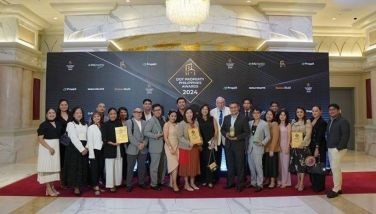Real estate, tourism sector partnership urged
MANILA, Philippines - The local real estate sector is bracing itself to coalesce with one of the country’s engines of growth, the Philippine tourism industry.
At the recent 4th Philippine Real Estate Festival, industry leaders cited the urgency of unifying the real estate and tourism sectors as both are considered to be the country’s twin engines of growth.
Jaime Cura, tourism congress vice president and former national president of the Chamber of Real Estate Builders Association (CREBA) said that the tourism industry has recognized the importance of drawing the real estate sector into greater involvement in the development of tourism-related projects.
He said the objective is to rev up the growth and development of tourism in the country to more globally competitive levels.
“The Philippines has a built-in competitive edge in its natural resources and the warmth and hospitality of its people who are skilled in global communication and comfortable with inter-cultural exchange,” Cura said.
He added that the challenge is to build on these natural advantages and develop the other facilities that the global tourism market demands.
Cura said that about 60 percent of tourism is made up of real estate.
These real estate-based projects include leisure, entertainment, business and vacation facilities and amenities, such as hotels, resorts, theme parks, retirement communities, conference, exhibition, and convention centers, and wellness and medical centers for a growing global medical tourism market,
He noted that the union of the two sectors could very well contribute to the intention of the recently passed Tourism Act of 2009, which is to close the yawning gap between the number of foreign tourist arrivals in the country as well as its neighbors.
“Malaysia, Thailand, Singapore, and Indonesia have been registering millions of arrivals in double-digits for a good number of years now, while the Philippines has been unable to break past the four-million barrier,” Cura said.
He pointed out that the incalculable contribution of a revved-up tourism industry to the economies of those countries cannot be ignored by a country like the Philippines which is facing humongous problems of unemployment and underemployment.
“While tens of millions of its own manpower are forced to seek alternative employment outside of the country, tourism-related businesses could provide employment and other economic opportunities for many of them right here in their own country” he added.
Already, there are signs that global investors are showing growing interest in the tourism potentials of the Philippines for the global market, Cura, who also chairs this year’s PREF board of advisors, said.
New infrastructure projects in the Philippines, such as international airports, power generation plants, and modern toll roads and expressways, including the nautical superhighway from north to south of the Philippines, are convincing global investors to take a closer look at the country.
Cura however stressed that private sector participation is also key in helping the country become truly competitive in the tourism arena.
Ambassador Jose Antonio, representing the real estate sector during the event, said the real estate sector’s role in the tourism development is very critical especially from the private sector builders and developers.
Antonio, who chairs Century Properties, one of the top leading real estate development companies in the country, has called on leading property developers to start setting their sights on tourism-related types of developments especially in the countryside.
This year’s Philippine Real Estate Festival has chosen to give special focus on tourism development, as well as property projects that caters to foreign buyers of condominiums, balikbayans who would like to acquire properties in their respective home province and urban centers throughout the country.
On July 29-31, 2010, at the World Trade Center in Pasay City, leading practitioners in tourism-related businesses and industries from the Philippines and the ASEAN region are invited to take part in this year’s festival.
They will have the opportunity to share some of their best ideas and practices in the symposia and panel discussions that will form part of the festival as well as the exhibits that will showcase some of the more successful projects in the country and the ASEAN region.
The festival will also include organized trips to select tourism-related projects for the benefit of the foreign guests and local participants who have not yet visited the residential and resort type of projects.
- Latest





























